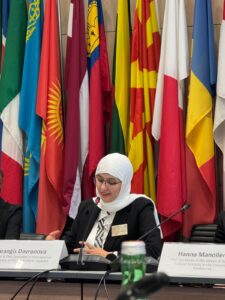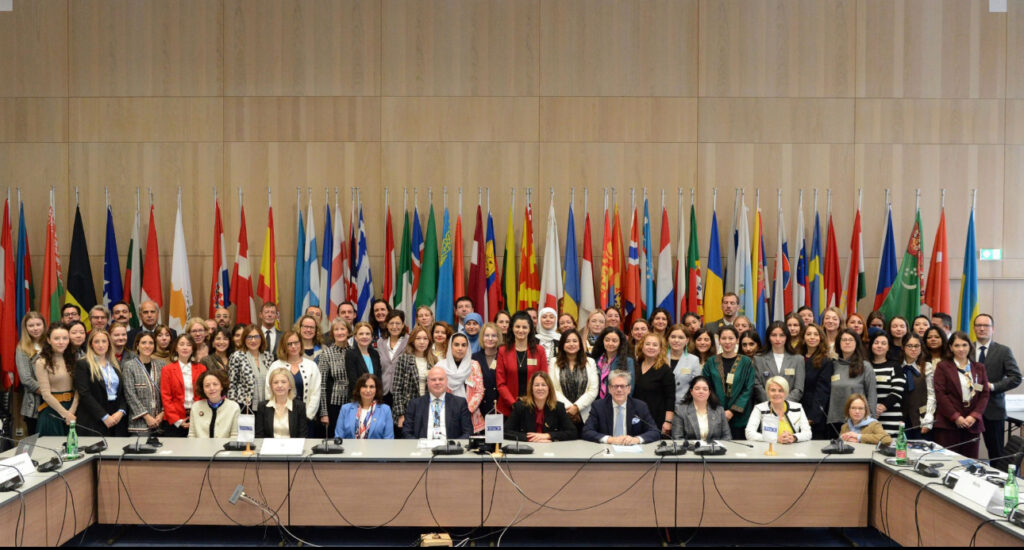 Davronova Farangis, PhD Candidate in International Public Policy at the University of Tsukuba and NipCA Fellow, participated as a participant and a speaker at the high-level event which marked the 25th anniversary of the United Nations Security Council Resolution 1325 on Women, Peace and Security (WPS). The conference was held at the historic Hofburg Palace in Vienna, Austria on Wednesday, October 22, 2025 and was followed by a two day alumni gathering.
Davronova Farangis, PhD Candidate in International Public Policy at the University of Tsukuba and NipCA Fellow, participated as a participant and a speaker at the high-level event which marked the 25th anniversary of the United Nations Security Council Resolution 1325 on Women, Peace and Security (WPS). The conference was held at the historic Hofburg Palace in Vienna, Austria on Wednesday, October 22, 2025 and was followed by a two day alumni gathering.
The gathering marked the 25th anniversary of United Nations Security Council Resolution 1325 on Women, Peace and Security (WPS)—a landmark framework that recognizes women’s essential role in peacebuilding. The event brought together ambassadors, women peacebuilders, diplomats, and researchers from 54 OSCE (Organization for Security and Co-operation in Europe) participating States, united by one vision: advancing women’s leadership for a more peaceful and inclusive world. The event fostered meaningful reflection, collaboration, and strategy-building, providing a space for women leaders to reconnect and later to co-design the future of the WPLP (Women’s Peace Leadership Programme) network.
Three thematic panels explored key dimensions of the Women, Peace and Security agenda:
- The first, “Women, Peace and Security Agenda Throughout the Years: What Works?”, examined effective practices and generated concrete recommendations for future progress.
- The second, “Women and Climate: A Call to Action”, addressed the nexus between women, climate, and security, emphasizing women’s participation in climate-related decision-making.
- The final panel, “OSCE Tools to Advance WPS”, explored how to strengthen women’s meaningful engagement in peace processes through collaborative and inclusive approaches.
During the opening panel session, moderated by Ambassador of Finland Svendsen Ellen, Ms. Davronova joined distinguished peace leaders and diplomats as a panel speaker to reflect on the evolution of the WPS agenda and its implementation in diverse contexts. Drawing on her experience as both a journalist and researcher, she emphasized that“investing in women’s leadership is not optional but essential”. Her speech highlighted the role of media, storytelling and academia in making peacebuilding processes more visible, relatable, and inclusive: “Peace is not only negotiated at the table”, she shared, “but built every day by women who lead, organize, and inspire change in their communities, and it is very important to tell such stories”. Her remarks inspired active dialogue among participants on how communication, empathy, and visibility can transform peacebuilding into a shared societal responsibility.
About the OSCE Women’s Peace Leadership Programme
The Women’s Peace Leadership Programme is one of the flagship initiatives of the OSCE Networking Platform of Women Leaders, including Peacebuilders and Mediators. Its goal is to strengthen women’s ability to meaningfully engage and influence peace processes at all levels.
In 2023–2024, Farangis was selected as one of only 16 exceptional women from across the OSCE region and Afghanistan to participate in the programme’s second edition. Throughout the year-long fellowship, she received advanced training in leadership, mediation, dialogue facilitation, conflict resolution, and gender-sensitive peacebuilding, while expanding her professional network of women leaders across Europe, US, and Central Asia.
You can read more about Farangis’ WPLP experience and story here.




